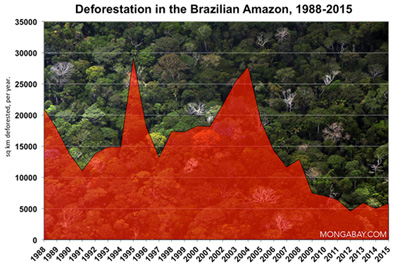Politics and the Amazon
An editorial by Christa Maas
Mongbay.com - January 14, 2008
In terms of environmental conservation, the Amazon is a logistics nightmare. How does Brazil protect 4.2 million square kilometers of forest with a border of 10.938 km?
No doubt, the Brazilian government has taken positive steps, and as Brazil's president Lula states "the Brazilian government, its society and institutions will save the Amazon," but the sheer size of the Amazon tells us that only well- structured international cooperation under leadership of the Brazilian government would make this possible in the long run.
The Brazilian Armed Forces have created a "strategic plan for national defense" which will increase the Army's presence in the region and make it easier to exert control over non governmental agencies. The army controls the Sivam, a $ 1.4 billion dollar program created in 1985 by former president Fernando Henrique Cardoso, to patrol the borders of the Amazon via satellite, radar, sensors, weather stations and telecommunications, employing about 190 000 soldiers. They are the only ones actually located and working inside the rain forest, while other non-military government organs like the Ibama, Incra, Funai and Funasa are located in Belém and Manaus.

Today, there are 100 000 non governmental organizations (NGO) active in the Amazon of which 29000 have received government funding. But the Brazilian Federal Police and Intelligence Agency worry that many of these NGO are covers for drug traffickers, human slavery, gun runners, bio-pirates and international intelligence agencies. More than half of these NGO have employees that also work or worked for the environmental authorities of the Brazilian government. This leaves too much room for favoritism and corruption. At the same time there are few regulations that make NGO openly accountable. Three weeks ago, the Brazilian government announced an investigation of all foreign NGO active in the Amazon and regulations that will tighten the government's control over them. A report is expected to be finished within 90 days.
One of the major problems for foreign efforts and cooperation is the language barrier. Under president Lula, the Brazilian government passed a law whereas Brazilian diplomats need not be able to speak English and many of the NGOs working in the Amazon have employees who speak only English and have not learned Portuguese. In some of their projects, it has become apparent how important it is to understand language, culture and logistics of the Amazon in order to have a meaningful impact and management of programs there. One international group has been mentioned because they were catacising Brazilian Indians in the English language, which obviously does not make sense.
Projects that have been successful are more often than not partnerships between international and local funding and management (government, private and institutional) and employ the local community in the effort of protection while furnishing alternatives for their subsistence.
Let's hope Brazil finds a viable way to continue asserting sovereignty over the largest part of the Amazon without letting too many political issues cloud the path to the continued conservation of the world's largest remaining rain forest!
Read more... Sphere: Related Content









No comments:
Post a Comment